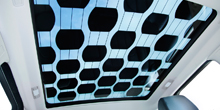Webasto Car
Contact
Webasto-Edscha Cabrio GmbH
Headquarter
Seckerstr. 3
94491 Hengersberg
Plant
Scharwaechterstr. 5
94491 Hengersberg
Roof Systems with Solar Technology

Solar Roof - the Most Efficient Eco-Innovation
As of the year 2020, EU regulations prescribe the permissible threshold value for new car fleets in Europe at 95 g CO2/km. This requires major efforts on the part of the automobile manufacturers. The reason: Financial penalties will be imposed for exceeding these values. Therefore, every gram of CO2 saved counts.
Fill up on sunshine
Our solar roofs allow you to lower your fuel consumption and thus the carbon emissions of your new cars. The solar cells integrated into the roof system produce electricity that can be fed directly into the battery by using intelligent battery management. This results in decreased load on the alternator, reducing fuel consumption. That is why in 2014 the European Commission has approved the designation of the ‘battery charging solar roof’ as an eco-innovation.
The savings can be this great

On average, a spark ignition engine emits 2.3 g/km less CO2, a diesel vehicle about 1.6 g/km less when there’s a solar roof on board. Thus, the solar roof is considered the most efficient eco-innovation currently on the market and it can make a noticeable contribution to reducing fuel consumption. (These values apply for a solar roof equipped with monocrystalline high-efficiency cells with an efficiency factor of 20%, an output of 100 Wp and a cell-active surface of 0.5 square meter).
Eco-Innovations: Offsetting of up to 7 g CO2/km possible
Eco-innovations refer to vehicle-specific and trend-setting technologies that verfiably reduce the CO2 emissions of new cars. Thus, they represent meaningful supplements to drive-based solutions. Since the eco-innovations‘ potential capacity to generate CO2 reductions cannot be measured by the official test method (NEDC), it is determined mathematically. If the eco-innovation is acknowledged and officially listed, automobile manufacturers can lower the carbon emissions of new cars by incorporating one or more of these technologies in their cars. The use of multiple eco-innovations is also permissible. The combined eco-innovations can amount to a maximum off 7 g CO2/km per new car in the fleet.
